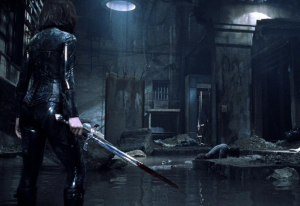Alan Moore has rarely had nice things to say about superhero movies, and in a new interview, he’s doubled down on previous criticisms that their popularity is a sign of a culture in decline. Linking the wave of right-wing populism that washed across Western democracies in 2016 with the same cultural attitudes that embraced a half-dozen superhero movies that year, Moore admits that he never watches them — not even something like Joker, which is only marginally superheroes and which wears its Moore influences on its purple sleeve — because he can’t rationalize buying into a system that has so frequently and intentionally failed to do right by the creators responsible for its success.
Videos by ComicBook.com
Moore, who retired from writing comics in 2018, has good cause to opine on the superhero movies he doesn’t watch: he understands that they more or less drive public perception of the characters.
“Most people equate comics with superhero movies now,” Moore told Deadline. “That adds another layer of difficulty for me. I haven’t seen a superhero movie since the first Tim Burton Batman film. They have blighted cinema, and also blighted culture to a degree. Several years ago I said I thought it was a really worrying sign, that hundreds of thousands of adults were queuing up to see characters that were created 50 years ago to entertain 12-year-old boys. That seemed to speak to some kind of longing to escape from the complexities of the modern world, and go back to a nostalgic, remembered childhood. That seemed dangerous, it was infantilizing the population.”
“This may be entirely coincidence, but in 2016 when the American people elected a National Socialist satsuma and the UK voted to leave the European Union, six of the top 12 highest grossing films were superhero movies,” Moore added. “Not to say that one causes the other but I think they’re both symptoms of the same thing – a denial of reality and an urge for simplistic and sensational solutions.”
While it is far from a widely accepted view, Moore is hardly alone in accusing superhero stories of embracing the same strongman ideology that makes fascism an attractive worldview to some: the notion of characters like Batman and Superman being there to prop up a failing status quo with force has been around for years, and in recent years, as the movies have become more and more adult and their impact has grown, the idea of superheroes as a stand-in for fascism is one that has been written about pretty extensively.
Moore’s remarks are not exactly new — while some of the phrasing is novel, it’s part of a continuum that has been ongoing for years, as he himself points out — but it’s likely to raise fan hackles. As the writer behind fan-favorite comics like Watchmen, The Killing Joke, and Whatever Happened to the Man of Tomorrow?, Moore can’t help but stand out to comics fans, who tend to read his frank, often coarse interview answers and pop into the comments to accuse him of being an angry old man.
Those accusations come fast and furious when Moore, who acknkowledges his role in helping create the graphic novel market in the ’80s with Watchmen, repeatedly characterizes superheroes as children’s entertainment and takes aim at those who would try to age them up for their modern audience.
“They have a long line of ghosts standing behind them,” Moore said of superheroes and superhero movies. “In the case of Marvel films, Jack Kirby [the Marvel artist and writer]. I have no interest in superheroes, they were a thing that was invented in the late 1930s for children, and they are perfectly good as children’s entertainment. But if you try to make them for the adult world then I think it becomes kind of grotesque.”
Moore gave the interview in support of his upcoming film The Show, which has ties to the short films he produced a few years ago. Protagonist Pictures is handling the film, which will debuted online yesterday and will get a physical screening on October 12.








